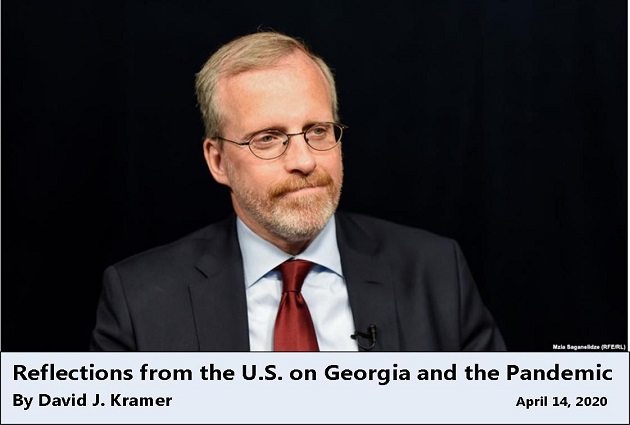
In most respects, to compare the United States and the Republic of Georgia is absurd. Georgia has one percent of the population of the U.S. and is slightly smaller than the state of South Carolina in size. Some 20 percent of Georgian territory is occupied by Russian forces, whereas the United States maintains a presence in dozens of countries around the world. But when it comes to the Coronavirus pandemic, Georgia has done a better job in handling the situation than the United States. As this goes to press, the government of Georgia reported 272 confirmed cases of infection; already 68 of those have recovered. Close to 5,000 people are under quarantine and nearly 450 are under examination in hospitals. Tragically three people died of COVID-19 related causes, but that number in percentage terms is significantly lower than many other countries, including the U.S.
Credit for this goes to everyone in the country, from the government to those in the opposition, to civil society and the media. The people of Georgia were early in taking the crisis seriously and deserve real praise for following stringent measures to reduce the likelihood of transmission and exposure. Georgia also excels in medical and scientific research and analysis, in part thanks to American support under the Lugar Research Center (named after the late Senator from Indiana, Richard Lugar). Contrary to nefarious Russian disinformation that the Center is a possible source of the virus, U.S.-Georgian cooperation in this field is a sign of our bilateral success and gives Georgia an advantage over other some countries in analyzing the situation from a scientifically-grounded basis.
Given the rising number of cases of infections in neighboring states, the people of Georgia must remain vigilant in their practicing of social distancing. That includes this Sunday, when Easter will be observed in the Georgian tradition. This is not the time for parishioners to show up at church services, and any Church leaders who encourage such behavior should be ignored and shunned. This past Sunday was Easter in the United States. Almost all churches were closed and instead broadcast their services via the Internet. While access to the web may be more limited in parts of Georgia than here in the U.S., all Church leaders in Georgia should practice the same thing: no in-church services but instead find innovative ways to celebrate this important holiday with their congregations.
Some church-goers in the U.S. claimed that their faith would protect them from infection. Alas, the virus shows no bias for or against any religious believers, or non-believers, and also respects no boundaries or buildings. Any and all are susceptible if they do not practice proven methods to reduce the odds of infection.
In the U.S., some governors made exemptions for church services for Easter. Doing so was short-sighted and should not be replicated in Georgia. These are unprecedented times requiring unprecedented measures, and that includes not attending churches,synagogues and other places of worship. The pandemic is global, with no country safe from its spread. Attending church services would risk an explosion of the virus in Georgia and undo all the good that has been achieved so far.
While fighting the virus is the top priority everywhere, Georgia also faces the challenge of holding parliamentary elections this fall. This is an election year in the United States, too, and there is growing talk of enabling people to vote safely via mail to avoid exposing them to health risks. Because of the stupidity and stubbornness of the local legislature in the state of Wisconsin, we witnessed long lines of voters for the Democratic primary election last week, forcing people to choose between their health and upholding their right to vote. Few in the U.S. want to see a repeat of that in other primaries or in the general, election this November.
Georgia needs to be thinking now about ways to ensure safe voting for all its citizens come the fall. Political tensions rose over the way to choose the next parliament after the current parliament, with majority control in the hands of the Georgian Dream Party, last year failed to pass promised electoral reform. Agreement among the government and opposition parties last month, however, eased those tensions and represented “a crucial step towards depolarization and normalization of the political environment in Georgia, as the U.S. Embassy in Tbilisi described it.
Under the agreement, signed in the form of a Memorandum of Understanding, the sides agreed that parliament will consist of 120 members elected through a proportional voting system, while 30 members will be elected through a majority system. Following this achievement, the authorities and opposition now must work together to ensure the election takes place as scheduled and that voters will be safe from health risks when casting their ballots. Now is the time to be discussing various options instead of waiting until the last minute. The same, by the way, is true in the United States and in many of the other countries around the world slated to hold elections.
Despite having experienced life under Soviet domination, a civil war 30 years ago and a Russian invasion a dozen years ago, citizens in Georgia have never faced anything like the COVID-19 pandemic before. The social distancing and measures needed to reduce its spread are causing anxiety, depression and economic difficulties for many. That makes it even more necessary for the ruling party and those in the opposition to recognize that they face a common threat – the virus – and that political difference, to the extent possible, should be put to the side.
Here, the U.S. is not a great model. While the stimulus package was passed by Congress with huge bipartisan majorities, President Trump has not put aside his partisan attacks, and nor have many Democrats. Calls for unity get drowned out by attacks on the press, personal criticism of local and national leaders, and doubts about the reliability of media reports. This sadly appears to be the new normal in my country, but during times of crisis it can be downright dangerous and even deadly.
Georgia should not repeat our mistakes. Those in power should not use the crisis as grounds for abusing power. As it is, freedom of assembly has been impinged because gathering in large groups would run contrary to national health. This means opposition protests must be put on hold. Similarly, freedom to travel for many has been restricted. But there should be no excuse for attacks on journalists, opposition figures or civil society activists, and the same applies to the opposition parties.
In this respect, this week’s sentencing of former defense minister Irakli Okruashvili to five years in jail for his involvement in protests last June is not helpful; its timing seems to exploit the current situation where protests are hard to muster. The U.S. Embassy in Tbilisi described the situation this way: “The timing and circumstances of Irakli Okruashvili’s arrest raised concerns about political interference and the selective use of justice. The case casts a shadow over the impartial application of justice – a concern the March 8 Joint Statement was intended to dispel. We urge all signatories to uphold the letter and spirit of the March 8 agreement.”
At the risk of sounding naïve, this is a time for Georgians to come together. There will be time for politics later. As a frequent visitor to and huge fan of Georgia, I want to see the country and its citizens come through this crisis in as good shape as possible. I look forward to returning to Georgia, hopefully this fall, to look back on this challenging time, to remember those who died during it as well as those who sacrificed so much to keep us safe and healthy. We must maintain our democratic principles and respect for human rights. And we must learn and improve from this experience and, as Americans and Georgians, become stronger together from it. These are very difficult times, but this is not the end.
